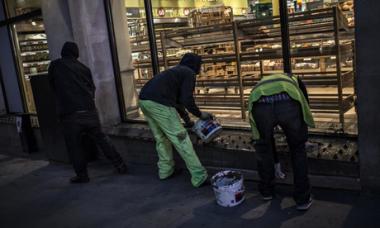They are, they say, "a modest organisation, but highly effective for our size. We're not going anywhere, and we'll keep going. Most of us have nothing anyway, so what have we got to lose? We're prepared to do anything it takes."
What it took this week – to wild acclaim on social media – was a night-time raid on Tesco in Regent Street, London, to cover two rows of steel studs on the storefront windowledge with a messy, but highly effective, layer of concrete.
For the supermarket (which has since removed them), the offending protrusions were "studs aimed at curbing anti-social behaviour" such as loitering and public drinking; for the underground group behind the operation – and for many other campaigners – they were "anti-homeless spikes".
The London Black Revs (short for "revolutionaries") told Vice reporter Simon Childs that it would consider acting against "every organisation planning to put homeless spikes up", recommending instead they "give the money to a local shelter organisation, food kitchen, or food bank".
Describing itself as a "closed black and Asian revolutionary socialist group", LBR says its members are "young, black, very political" and fed up with the "lack of militancy" displayed by most political organisations.
The group, which numbers around 20 members, but says it is "growing fast" and aims to launch a major recruitment campaign in sixth-form colleges this autumn, has in recent weeks used leaked details of a UK Border Agency campaign against illegal immigrants to warn as many as it can that they are at risk of arrest and deportation.
It also told Vice that it played a leading part in the protests against a European election meeting held in London by Hungary's far-right Jobbik party in February, and says its other targets include police brutality, institutional racism, the bedroom tax and unfair evictions.
Asked why LBR made a point of calling itself a black and Asian organisation, the spokesman said the group "values its political allies", but has to start from "the basis of the makeup of our group. We can't aim to speak for people outside of our race or social experience."
Originally published on theguardian.com.


